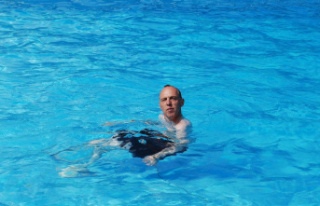Poland is far from content with the compensation offered by Germany for the delivery of more than 200 Soviet-designed tanks to Ukraine. Defense Minister Mariusz Blaszczak said in an interview published on Saturday that the federal government wanted to deliver 20 Leopard 2A4 main battle tanks, which would only be operational in 12 months. However, Poland expects at least 44 tanks to be able to equip a tank battalion.
"Certainly there are gifts that should be accepted with great caution," the minister told the wPolityce.pl news portal. "Their low value later serves as a useful curtain to cover up a much more brutal reality." Deputy Foreign Minister Szymon Szynkowski vel Sek had previously spoken in the "Spiegel" of a "deceptive manoeuvre" by Germany.
A spokesman for the federal government said on Saturday when asked by the DPA that the statements had been taken note of. "The federal government is still willing to organize a ring exchange with Poland." In Berlin, however, it was also said that one was surprised at the sharp political tones from Poland. At the technical level, the discussions were always constructive.
Federal Foreign Minister Annalena Baerbock (Greens) rejected the accusation of breach of word. "In a situation like this, nobody deceives their European neighbors," she said in a "Bild" TV interview. However, she admitted that the exchange of rings with NATO partners to supply the Ukrainian army with heavy weapons is not going as planned.
Ring exchange means that Eastern European allies deliver weapons of Soviet design to the Ukraine and receive weapons from Germany in return. Soviet-made weapons are easier for Ukrainian soldiers to use than Western-made equipment, which is new to them.
The federal government has held talks with countries such as the Czech Republic, Greece, Poland, Slovakia and Slovenia to organize ring exchanges. Chancellor Olaf Scholz (SPD) promised early results in the Bundestag in early July. The federal government has "now specified these agreements with several countries to such an extent that they will be directly linked to extradition." Since then, however, no new agreements have been announced.
Poland has supported Ukraine with more than 200 Soviet-built T-72 tanks. The delivery had already been initiated in April. The government in Warsaw is demanding replacements from its allies in order to remain capable of defending itself.
According to the German Defense Ministry, Poland was offered 100 available Leopard 1 tanks in good condition at an early stage of the negotiations. Poland rejected this as too old. It had become clear that Poland insisted on the Leopard 2. However, these cannot be supplied from Bundeswehr stocks.
Both Leopard variants offered by Germany are of older design. The first prototype of the Leopard 1 main battle tank dates back to 1963, and the first Leopard 2A4 was delivered to the Bundeswehr in 1979. The most modern version is the 2A7 from 2010.
"It was clear from the start that we wouldn't be able to replace every single tank overnight with a snap of our fingers," Baerbock said of the difficulties. "But obviously, with a view to Poland, the situation is such that we can't find a solution." That goes "of course to everyone's kidneys".
Baerbock also fundamentally questioned the exchange of rings. It was originally believed that they were the quickest way to help Ukraine in its fight against the Russian invaders. "If this path wasn't the right one - and I don't know who always knows immediately in wartime situations that this is the perfect path - then of course we have to reflect on it and see how we can then take action elsewhere."












